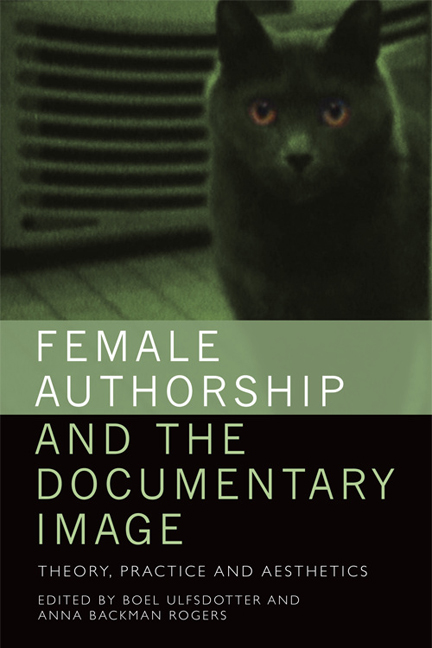Book contents
- Frontmatter
- Contents
- List of Illustrations
- Notes on the Contributors
- Foreword
- Introduction
- PART ONE DOCUMENTARY PRACTICES
- PART TWO DOCUMENTARY THEORIES
- PART THREE FEMALE AUTHORSHIP AND GLOBAL IDENTITIES
- ‘Being a Woman Documentary Maker in Taiwan’ – An interview with Singing Chen and Wuna Wu
- Select Bibliography
- Index
Interview: ‘The Final Projects of Hannah Wilke and Jo Spence’ – A Dialogue between Elena Crippa and Anna Backman Rogers
Published online by Cambridge University Press: 05 May 2021
- Frontmatter
- Contents
- List of Illustrations
- Notes on the Contributors
- Foreword
- Introduction
- PART ONE DOCUMENTARY PRACTICES
- PART TWO DOCUMENTARY THEORIES
- PART THREE FEMALE AUTHORSHIP AND GLOBAL IDENTITIES
- ‘Being a Woman Documentary Maker in Taiwan’ – An interview with Singing Chen and Wuna Wu
- Select Bibliography
- Index
Summary
ABR: In their projects, Intra-Venus, The Picture of Health and The Final Project, Hannah Wilke and Jo Spence respectively turned the camera on their own vulnerable and dying bodies. Wilke in particular was plagued with the accusation of narcissism throughout her career. In your view, is this a critique that is frequently levelled at women who self-document and to what extent do you think the work of Wilke and Spence counteracts or confronts this reading of their work? Both artists seem to be profoundly aware of the gaze and how they, as photographic subjects, might be read by an observer.
EC: Both Spence and Wilke were well aware that in any given context men and women are social actors, reproducing or defying learned and accepted behaviour and accepted typologies to do with gender. They both used performance in order to embody and produce images that challenged conventions on the role, tasks and demeanour that women should themselves perform in order to be socially acceptable. They both turned their camera towards themselves, for all or most of their adult life and career. However, Spence's way of holding her body and performing her sexuality, as she analyses in Beyond the Family Album, reflected both her insecurities – her feelings that she lacked beauty, that her breasts were too large, as well as her ongoing poor health – and her desire to understand one's image and self-image in relation to the ‘invisible class and power relationships into which we are structured from birth’. Spence's work was not readily susceptible to accusations of narcissism. On the other hand, Wilke's work, from sculpture to performance, was richly tactile (about the folding and unfolding of forms), gestural and sensuous. She was aware of her beauty and performed an erotic, self-empowered woman. She exposed her lived desire and pleasure by focusing not so much on the image of the body – as in the case of Spence – but on its way of being and unfolding, comfortable with itself. What seems to be truly transgressed in Wilke's performance and depiction of her self is that it says I am comfortable if not in love with myself.
- Type
- Chapter
- Information
- Female Authorship and the Documentary ImageTheory, Practice and Aesthetics, pp. 66 - 72Publisher: Edinburgh University PressPrint publication year: 2018



